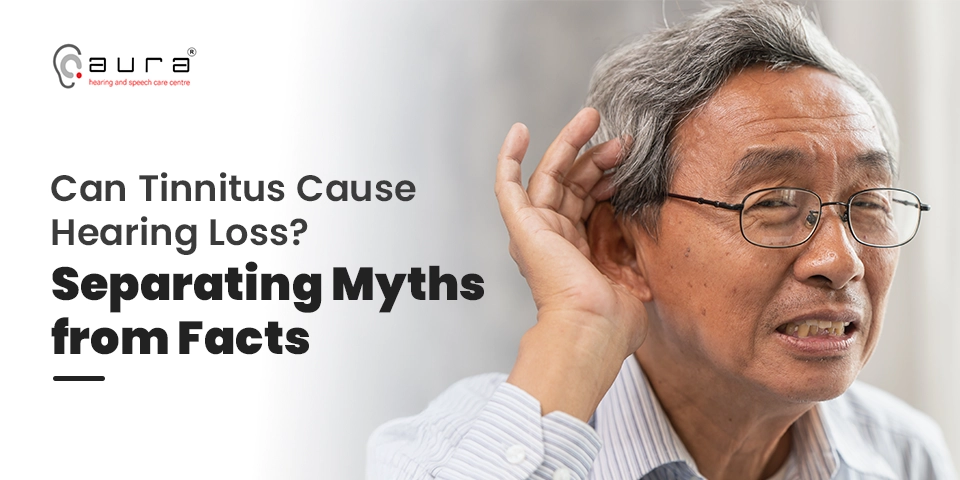
Tinnitus is a condition when you hear noises like ringing or buzzing in your ear, even in silence environment. According to the World Health Organization, around 16 million people seek medical attention for tinnitus annually.
At present, there is a lot of misinformation about tinnitus, and it’s very important to separate tinnitus myths from facts for management of the condition. In this blog, we will separate common myths of tinnitus from facts and also important measures to prevent this condition.
Common myths about tinnitus:
- There is no cure for tinnitus
Many people think that they have to live with tinnitus lifelong, as there is no treatment. But that’s not true; there are various treatments available for this condition. Treatments like sound therapy, relaxation techniques, and hearing aids with masking features are some of the treatment options available to treat this condition.
- Aging is a major cause of tinnitus
While aging is the major cause of tinnitus and is commonly seen in older people, it can also affect younger age groups. Factors like exposure to loud music, occupational noise, or stress can cause tinnitus in younger individuals.
- Tinnitus leads to permanent damage of the ear
Tinnitus doesn’t always mean permanent hearing damage; it can be temporary, triggered by factors like loud noises, ear infections, or stress. Figuring out the cause is important to treat the problem.
Some Interesting Facts About Tinnitus:
- Tinnitus can be treated
Most of the time, tinnitus goes away on its own. However, prolonged exposure to loud sound can lead to chronic tinnitus. So, it is important to protect your ear.
- Lifestyle changes can improve tinnitus
You can treat tinnitus by changing a few things in your daily routine. Stress can make it worse, so try relaxing activities like meditation or deep breathing. Getting good sleep is also important, so stick to a regular bedtime routine. Lastly, reduce the consumption of coffee, cigarettes, and alcohol, as they can sometimes trigger or worsen the ringing. Identifying what makes your tinnitus worse and avoiding those things can really help.
- There are various treatments available
Sound Therapy: Using products like white noise machines, nature sounds, or special tinnitus devices can help reduce ringing in your ear.
Hearing Aids: If you also have trouble hearing, hearing aids can make outside sounds louder, which can make the ringing less noticeable. Aura Hearing Care offers a range of advanced hearing aids, including:
o Receiver In Canal (RIC): The device is compact and hidden, good for people new to hearing aids.
o Completely in the Canal (CIC): It is designed to fit completely inside your ear canal.
o Invisible in Canal (IIC): This is a minimal device, almost totally hidden, with just a tiny part to help take it out.
o In the Canal (ITC): Fits partly in the ear canal, with a small portion showing.
o In the Ear (ITE): This is a personalized hearing aid, designed to fit the outer ear for comfort.
o Behind the Ear (BTE): This device is the most used type and is available in different sizes.
Counselling: Talking to a specialist can help you change how you think about the ringing and make it less bothersome.
Preventive Measure For Tinnitus:
Some simple preventive measures for tinnitus are:
- Protect your hearing:
- Avoid loud noises. Wear earplugs or earmuffs in noisy environments like music concerts, construction sites, or noisy environments.
- Manage stress:
Practice relaxation techniques like meditation, yoga, or deep breathing.
- Take care of your overall health:
- Maintain a healthy diet
- Get enough sleep
- Manage blood pressure
- Avoid smoking and limit alcohol and caffeine intake
- Be mindful of medications:
Some medications can lead to tinnitus. Discuss potential side effects with your doctor before taking any medications.
- Address underlying health conditions:
- Treat ear infections immediately
- Get regular checkups
Conclusion:
In conclusion, while tinnitus itself doesn’t cause hearing loss, they often share common roots and can influence the condition. Tinnitus can make it seem like you have hearing loss by masking sounds, and existing hearing loss can make tinnitus worse. It’s important to get your hearing checked regularly, protect your hearing, and manage any underlying health conditions to address both tinnitus and potential hearing loss problems.
If I have tinnitus, does that mean I’m going deaf?
No. Tinnitus itself doesn’t directly cause hearing loss. However, they often share underlying causes, like noise damage or age-related changes. It’s important to get a hearing test to identify if any actual hearing loss is present.
Can the ringing in my ears make it harder to hear?
Yes. Even without actual hearing loss, tinnitus can make it difficult to hear clearly. The constant noise can distort sounds, especially in noisy environments, making it seem like you have a hearing loss problem.
What can I do to prevent tinnitus and protect my hearing?
Protecting your hearing from loud noises is important. Wear earplugs or earmuffs in noisy environments and keep the volume down on headphones. Moreover, maintaining a healthy lifestyle and addressing underlying health conditions can also help.
Does Aura Hearing Aid provide hearing aids for tinnitus?
Yes, if medicine doesn’t fix it, Aura Hearing Aid has the best hearing aid options to make sounds clear and improve your hearing.
How can I book a consultation with Aura Hearing Aid?
You can go to our website (Types of Hearing Aids | Find the Best Fit for Your Needs) or call us to make an appointment with our hearing experts.







